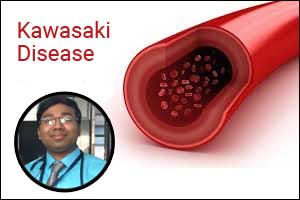- Home
- Editorial
- News
- Practice Guidelines
- Anesthesiology Guidelines
- Cancer Guidelines
- Cardiac Sciences Guidelines
- Critical Care Guidelines
- Dentistry Guidelines
- Dermatology Guidelines
- Diabetes and Endo Guidelines
- Diagnostics Guidelines
- ENT Guidelines
- Featured Practice Guidelines
- Gastroenterology Guidelines
- Geriatrics Guidelines
- Medicine Guidelines
- Nephrology Guidelines
- Neurosciences Guidelines
- Obs and Gynae Guidelines
- Ophthalmology Guidelines
- Orthopaedics Guidelines
- Paediatrics Guidelines
- Psychiatry Guidelines
- Pulmonology Guidelines
- Radiology Guidelines
- Surgery Guidelines
- Urology Guidelines
New technique for diagnosing Kawasaki Disease- Dr Manojit Mondal

Kawasaki disease (KD), also known as Kawasaki syndrome or mucocutaneous lymph node syndrome is a serious illness characterized by inflammation of blood vessels throughout the body. The disease is named after Dr Tomisaku Kawasaki, a Japanese paediatrician who first described the disease in 1967. Though the exact cause of KD is not known most investigators believe that the disease is probably driven by abnormalities of the immune system initiated by the infectious insult. The disease occurs mainly in young children, with 80% of patients are younger than 4 years of age. What makes KD of great concern is its association with coronary artery vasculitis leading to coronary artery aneurysms (CAAs) in up to 25% of untreated patients.
There is no specific diagnostic test or pathognomonic clinical feature of KD. The diagnosis of KD is often delayed due to the similarity in the clinical manifestation with other common febrile illnesses of childhood. Delayed diagnosis is a risk factor for developing CAAs and treatment is often initiated only when coronary artery dilatation is already demonstrated on echocardiography.
To address this diagnostic issue, a case-control study involving 606 children (of which 404 in the discovery cohort and 202 in the validation cohort) was performed. A 13-transcript blood gene expression signature was identified that accurately distinguish Kawasaki disease from other febrile illnesses presented with similar clinical features. This diagnostic blood test using the measurement of small numbers of host gene transcripts had a sensitivity of 81.7% and specificity of 92.1% in distinguishing KD from other illnesses in the discovery test set. In the validation set, the test had a sensitivity of 85.9%, and specificity of 89.1% in distinguishing KD from febrile controls.
So this minimal whole-blood gene expression pattern enables early reliable diagnosis of KD and will enable the physician to institute appropriate management to prevent CAAs.

Disclaimer: This site is primarily intended for healthcare professionals. Any content/information on this website does not replace the advice of medical and/or health professionals and should not be construed as medical/diagnostic advice/endorsement or prescription. Use of this site is subject to our terms of use, privacy policy, advertisement policy. © 2020 Minerva Medical Treatment Pvt Ltd